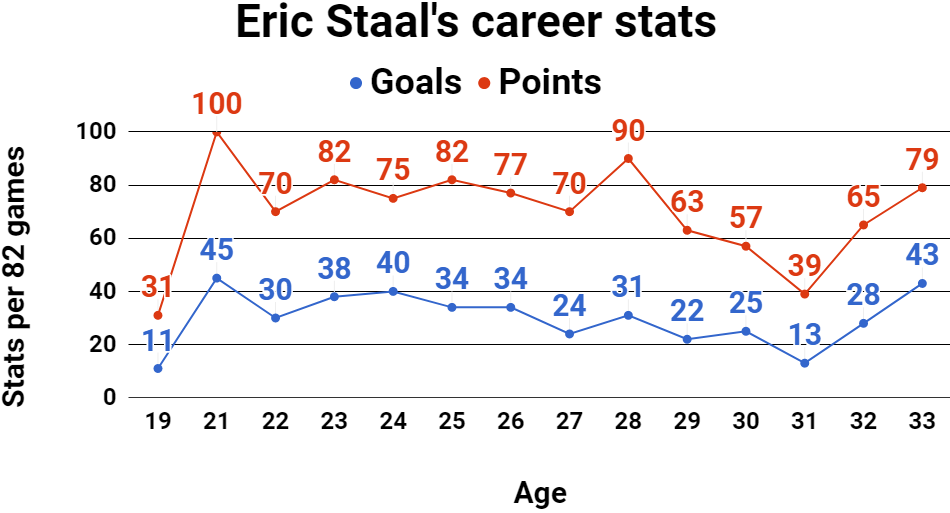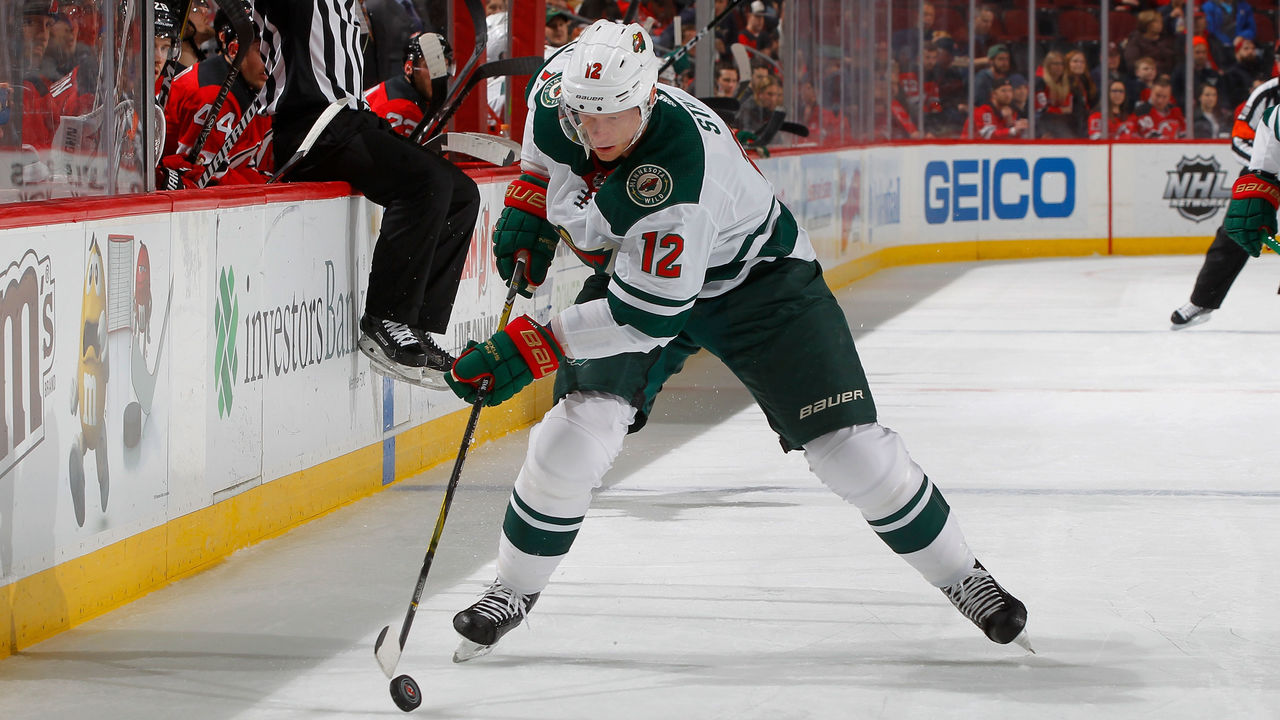Eric Staal battled 'moments of doubt' en route to remarkable resurgence
Atop this season's NHL goal-scoring list are pillars of consistency in Alex Ovechkin and Evgeni Malkin, fresh-faced superstars in Patrik Laine and Connor McDavid, and even an out-of-nowhere name in William Karlsson.
But the most interesting name on the ledger belongs to a guy who just recorded his first 40-goal season in nearly a decade: Minnesota Wild forward Eric Staal.
It didn't take long for Staal to establish himself as an elite NHLer, registering 100 points and winning the Stanley Cup in just his second season. Yet, as fast as he gained his superstar status, it vanished just as quickly, hitting rock bottom in the 2015-16 season.
During that disastrous campaign, he tallied just 39 points - including a mere six in 20 games after being traded from the Carolina Hurricanes to the New York Rangers at the deadline, for his lowest point total since his 2003-04 rookie season (31).
During that nightmarish 2015-16 season - also a contract year - Staal knew of what he was capable, but admitted he had doubts whether he'd be able to return to form.
"I didn’t think that I wouldn’t be able to be a good player on a good team," Staal told theScore. "I always believed in myself as far as what I could do in this league and what kind of player I was, but when you have a tough year like I did - that last season in Carolina, then moving to New York - you definitely have your moments of doubt. You have your moments of, 'how are you going to get out of this?'"
Staal wasn't alone in these moments of doubt. As a player on the wrong side of 30 in a league dominated by younger, quicker players, most people believed his best years were far behind him. Yet, with 40 goals - including a career-high 27 at even strength - in his second year in Minnesota, he's having arguably the second-best season of his career at age 33.
In the process, he joined Gordie Howe as the only players in NHL history to go nine or more years between 40-goal seasons, according to the Elias Sports Bureau.

(Photo courtesy: Action Images)
Had Staal entered free agency a few years earlier, he likely would've been one of the most sought-after players to hit the open market in recent memory. Instead, his value was at an all-time low, making his decision where to sign that much more important.
"For me, going into that summer it was trying to find the right fit to join an established - what I considered a good team - and then to find a fit at center with some good players," he said. "There seemed to be a hole there at the center position in Minnesota. They were trying a lot of different guys that I knew at center and just felt like it was a good fit for me."
Staal signed a three-year, $10.5-million contract with the Wild on July 1, 2016. Excluding players on entry-level deals, it's arguably the NHL's most team-friendly contract. Yet, even before he signed the deal, Staal was determined to restore his status as one of the game's best players, rather than one in decline.
"Going into that summer, it was just trying to find the right fit and the right opportunity for me to kind of re-establish myself and not only prove to other people, but prove to myself what I can do and what kind of player I am," he said.
Staal turned some heads with a nice bounce-back season last year, potting 28 goals with 65 points in 82 games. This year, though, he's taken his game to another level, as he's tied for fifth in the NHL in goals with an outside shot at averaging better than a point per game for just the third time in his career.
Staal's unexpected goal-scoring resurgence prompted head coach Bruce Boudreau to joke: "Start calling him Midas from now on. (Everything he touches) turns to gold. I hope it doesn’t end."
It's been quite a fascinating career arc for Staal, as seen in the graph below (totals were extrapolated over an 82-game average to account for the shortened 2012-13 season):

Excluding his rookie year, Staal's three worst statistical campaigns came in his age 29, 30, and 31 seasons. For most players, those three years represent the tail end of their prime. Those who struggle during those years rarely rebound, yet Staal is trending upward.
So why has Staal been able to defy the odds and have one of his best seasons as he approaches his mid-30s? For him, there's no secret formula, like New England Patriots quarterback Tom Brady and his TB12 method. Though there are many reasons, confidence has been the key.
"No, nothing different as far as training-wise going into the season," Staal laughed. "This year, the puck just seems to be hitting the back of the net. You get the confidence of scoring goals and the confidence of producing and that can carry a long way. You just want to hold onto that feeling as long as you can."
Another factor in his resurgence has been the league-wide slashing crackdown. While it hasn't resulted in many more penalties in general, it's created more space for skilled players such as Staal.
"It does (open things up) for sure," he said. "You just get a little more time with the puck. You're able to hang on to it a little more, and kind of work your way into some of those tighter areas without giving up that scoring chance."

(Photo courtesy: Getty Images)
Yet, perhaps the most interesting part about Staal's sensational season is that he's averaging just 17:55 of ice time per game - nearly two minutes below his career average, and the lowest since his rookie campaign.
"You always want to play more, but I think it has (helped keep me fresh)," he said. "There’s nights you’re going to feel great, and there’s nights when you’re not, and then there’s nights when you’re coming from behind, or playing more because of special teams. Every game is different."
What that has resulted in is some of the best per 60-minute numbers of his career, and some of the best in the league. Entering Tuesday, he sits fifth in the NHL (among players with at least 500 minutes) with 1.74 Goals/60 - which would stand as his career best. His 3.22 Points/60 would also be his best since Natural Stat Trick began keeping track in 2007-08.
Unsurprisingly, right behind Staal on the Wild in many key offensive stats are Jason Zucker and Mikael Granlund - who have spent most of the season on Staal's wings.
"Zucks is a guy with a ton of speed, so when you play with a guy with that speed, the defense usually backs up, gives gap, gives room to be able to make plays," Staal said.
"Granlund is one of those guys that can really make some great passes and looks in those tight spaces and those tight areas. For me, you get a little more opportunity to have the puck, a little more time to shoot, a little more space to operate."
While Zucker and Granlund have helped Staal raise his game, he's done the same for them. Zucker has already shattered his career highs in goals and points, while Granlund is just three assists away from setting a new career best of his own.
This season has put Staal - already a member of the prestigious Triple Gold Club - right back on track for a first-ballot Hall of Fame nod. Two years ago, it probably would've been more believable that he'd be out of the league by now. Instead, he's re-established himself as one of the game's best players, displaying remarkable resiliency in what's been a turnaround for the ages.